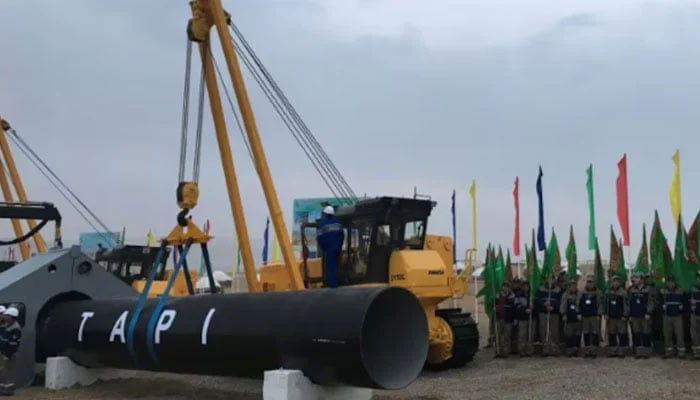White oil pipeline averts fuel shortage amid Sindh road closures
KARACHI: The pumping of motor gasoline (Mogas) through the white oil pipeline has helped avert a fuel shortage in the central and northern regions of the country, following a 10-day closure of roads in Sindh.
Pak-Arab Pipeline Company (Papco) -- a joint venture between Pak-Arab Refinery (Parco), Pakistan State Oil (PSO) and Shell Pakistan (now Wafi Energy) -- has increased the pumping of Mogas in recent days following the disruption of road transport, which normally carries fuel from Karachi to the rest of the country.
“Yes, this pipeline helped a lot to avert a fuel crisis upcountry during the current road closures,” PARCO Managing Director Irteza Qureshi told The News.Industry sources noted that although high-speed diesel (HSD) is the primary fuel transported via the pipeline, Mogas is also supplied through it, in addition to conventional road transport.
In recent days, the volume of Mogas pumped through the pipeline has increased to prevent shortages, especially in Punjab -- the country’s largest consumer of petroleum products. Refineries in Punjab have also ramped up Mogas supply to offset reduced deliveries from Karachi-based refineries, which have been unable to transport fuel by road.
Imported Mogas from oil marketing companies (OMCs) has been primarily moved through the pipeline during the disruption.
The sector insiders said the pipeline played a pivotal role in preventing shortages of both HSD and Mogas, as the ongoing canal dispute has hindered road transport from southern ports to central and northern regions.
With the capacity to receive both imported and locally produced petroleum products from multiple sources, the pipeline can distribute them to various demand centres across the country.
Industry officials highlighted the cost-efficiency of the pipeline, stating that it supplies around 50 percent of the country’s Mogas and 100 per cent of its HSD at a cost of approximately Rs2.32 per litre -- significantly lower than the Rs10 per litre incurred through road transportation.
They warned that the country could face a severe crisis if fuel supplies are disrupted for even four days, noting that the white oil pipeline has been critical in maintaining national fuel security.
Commissioned in March 2005, the pipeline spans 786 kilometres, featuring a 26-inch diametre pipeline, storage tanks, pumping stations, and other facilities. Its current transportation capacity stands at 8 million tonnes per year, with the potential to be expanded to 12 million tonnes when needed.
-
 Rebecca Gayheart Breaks Silence After Eric Dane's Death
Rebecca Gayheart Breaks Silence After Eric Dane's Death -
 Kate Middleton 2026 BAFTA Dress Honours Queen Elizabeth Priceless Diamonds
Kate Middleton 2026 BAFTA Dress Honours Queen Elizabeth Priceless Diamonds -
 Sterling K. Brown's Wife Ryan Michelle Bathe Reveals Initial Hesitation Before Taking On New Role
Sterling K. Brown's Wife Ryan Michelle Bathe Reveals Initial Hesitation Before Taking On New Role -
 BAFTA Film Awards Winners: Complete List Of Winners Updating
BAFTA Film Awards Winners: Complete List Of Winners Updating -
 Millie Bobby Brown On Her Desire To Have A Big Brood With Husband Jake Bongiovi
Millie Bobby Brown On Her Desire To Have A Big Brood With Husband Jake Bongiovi -
 Biographer Exposes Aftermath Of Meghan Markle’s Emotional Breakdown
Biographer Exposes Aftermath Of Meghan Markle’s Emotional Breakdown -
 Backstreet Boys Admit Aging Changed Everything Before Shows
Backstreet Boys Admit Aging Changed Everything Before Shows -
 Ryan Coogler Makes Rare Statements About His Impact On 'Black Cinema'
Ryan Coogler Makes Rare Statements About His Impact On 'Black Cinema' -
 Rising Energy Costs Put UK Manufacturing Competitiveness At Risk, Industry Groups Warn
Rising Energy Costs Put UK Manufacturing Competitiveness At Risk, Industry Groups Warn -
 Kate Middleton Makes Glitzy Return To BAFTAs After Cancer Diagnosis
Kate Middleton Makes Glitzy Return To BAFTAs After Cancer Diagnosis -
 NFL Star Rondale Moore Dies Aged 25, Minnesota Vikings Pay Tribute
NFL Star Rondale Moore Dies Aged 25, Minnesota Vikings Pay Tribute -
 Kim Kardashian Makes Huge Career Move Weeks After Going Public With Lewis Hamilton
Kim Kardashian Makes Huge Career Move Weeks After Going Public With Lewis Hamilton -
 Shia LaBeouf Draws Attention For Sweet Reason After Spending Time In Jail Over Brawl Incident Amid Mardi Gras Bash
Shia LaBeouf Draws Attention For Sweet Reason After Spending Time In Jail Over Brawl Incident Amid Mardi Gras Bash -
 Princess Eugenie, Beatrice Receive Strong Warning After Andrew Arrest: 'Zero Tolerance'
Princess Eugenie, Beatrice Receive Strong Warning After Andrew Arrest: 'Zero Tolerance' -
 Rihanna 38th Birthday Detail Breaks The Internet, Featuring Unexpected Huge Item
Rihanna 38th Birthday Detail Breaks The Internet, Featuring Unexpected Huge Item -
 Liza Minnelli Recalls Rare Backstage Memory With Mum Judy Garland In New Memoir
Liza Minnelli Recalls Rare Backstage Memory With Mum Judy Garland In New Memoir




